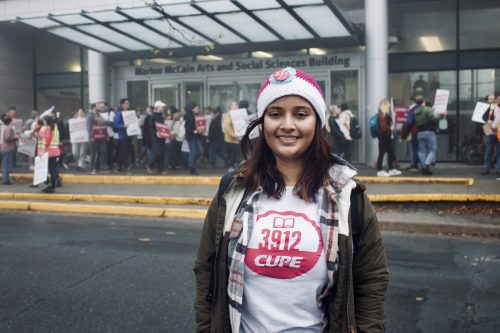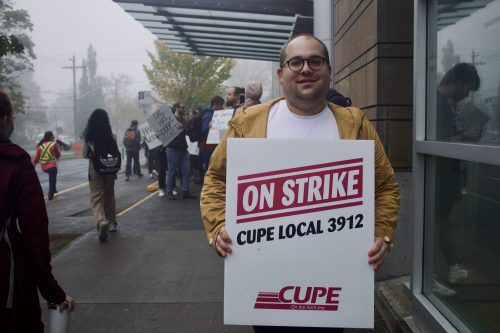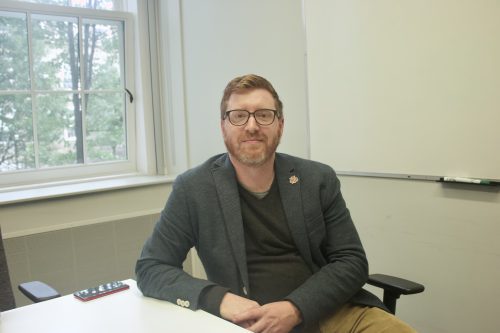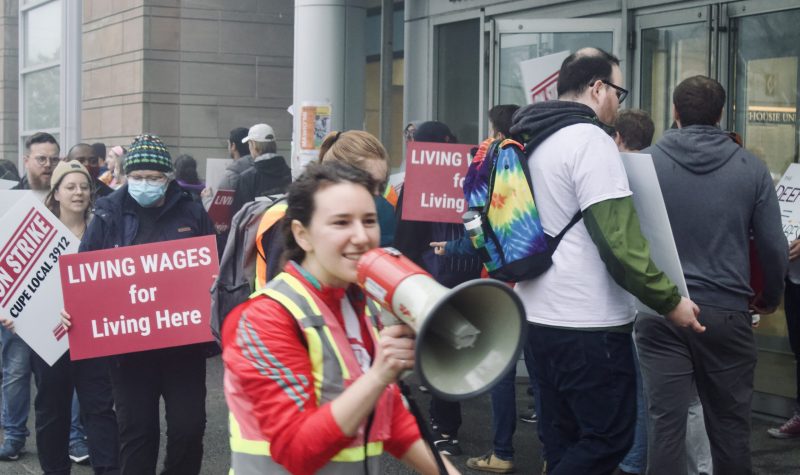Part-time trainers, teaching assistants, markers and protesters represented by CUPE 3912 (Canadian Union of Public Employees) at Dalhousie University went on strike on Wednesday morning to address their concerns focused primarily on increasing wages.
After failing to come to a tentative agreement at the bargaining table yesterday, CUPE members started the strike at 8 a.m., forming a picket line in front of Dalhousie's Marion McCain Arts and Social Sciences building until late in the afternoon.
Vice President of TAs, markers and demonstrations Sarrah Putwa said the union represents nearly 1,800 working staff who are in the same contract conditions without wage increases for the past three years.

Sarrah Putwa is the vice president of TAs markers and demonstrators at Dalhousie's Studley campus. Photo by Sara Gouda.
"Marker demonstrators are paid $8 lesser for the same work as TAs, and that category needs to go because they're making just a little bit above minimum wage. TAs and PTAs and markers demonstrators have not had a wage increase in the last three years, we've had a pay freeze," said Putwa.
Putwa said the union wants wage parity and inflation protection, and that part-time academics are asking for the marker demonstrator category to be gone entirely.
"The strike addresses the economic justice for your precarious academics on campus. This is your teaching assistants, your markers, your demonstrators, and your part-time academics who are responsible for running almost all the classes here," said Putwa.
She added that their current salary isn't comparable to other universities and that peers from other schools are being paid more for the same work.
"Our current wages are $24.41 for TAs, and we've not seen an increase in three years now. Markers and demonstrators make $16.61, that's $3 above minimum wage for the same work that TAs are doing," she said.
Putwa added that this strike was a last resort and that the union has been negotiating for two years.
"We were negotiating till the last possible moment yesterday, we didn't walk away from that table the employer did."

Adam Foster is a sessional instructor at Dalhousie's department of Political Science. Photo by Sara Gouda.
Adam Foster is a sessional instructor at Dalhousie's department of Political Science. He reached undergraduate students courses such as municipal law and city politics in Canada, and political thought from 1681-1798.
"We're picketing to stand up for our rights as workers and to campaign for a fair contract for part-time academics like myself, but also teaching assistants, and graders and demonstrators. We've been without a contract since 2019 and so we are just campaigning to get a fair contract," said Foster.
Foster said he would like to see a contract that allows a raise in line with inflation prices since their current contract does not keep up with inflation.
"So what I'm hoping will come out of this will be a fair contract for us that does keep up with inflation, and allows us to be able to work without having to worry about how we're going to be able to pay rent and how we're going to be able to put food on the table. Because when that happens, it just impacts the learning experience," added Foster.

Chris Hattie is Dalhousie's co-assistant vice president of human resources. Photo by Sara Gouda.
Dalhousie's co-assistant vice president of human resources Chris Hattie said this is the first strike to happen on campus in about 20 years.
"Negotiations have been ongoing with CUPE for an extended period of time, largely over the last two years. And, ultimately, I think the main issue that led to the strike is around compensation. The university and CUPE share a lot of common interest in trying to address the concerns that the union brought forward, particularly around wage comparability with our regional and national comparators," said Hattie.
When asked why the members in the union haven't seen a pay increase over the past three years, Hattie said wage adjustments take place as part of the collective bargaining process, and the last collective agreement with CUPE would have expired in 2020.
He also added that factors such as the impacts of the COVID-19 pandemic and other external factors have made the process longer in attempts to negotiate a new collective agreement.
"It's worth recognizing that about two-thirds of the members of CUPE are also students on campus, so we'll be feeling that impact in multiple ways," said Hattie.
A small number of classes have been canceled at Dalhousie, those taught by part-time instructors, and many others are being impacted due to teaching assistants, markers and demonstrators being on strike. Hattie said the goal is to limit any disruption by reaching a resolution as quickly as possible.
Students eager to learn more about CUPE 3912 strike can find more information on Dalhousie's website.
Listen to the full interview below:


